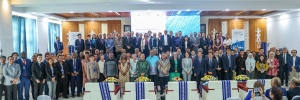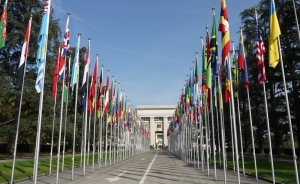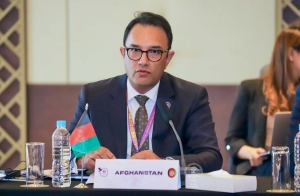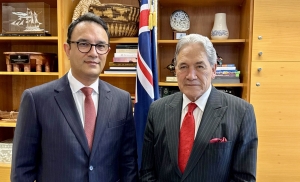On the evening of Thursday, 14 August, the Ambassador of Afghanistan delivered an official lecture at the Australian Institute of International Affairs (AIIA) in Melbourne.
Attended by around 90 diplomats, academics, researchers and media representatives, Ambassador Wahidullah Waissi provided an analytical overview of developments over the past four years, offering a detailed assessment of the factors shaping the current situation in Afghanistan, its implications for the international system, and possible pathways for a return to stability. He also presented a set of practical, policy-oriented recommendations for the Australian Government and other relevant actors aimed at strengthening accountability, supporting legitimate processes and preventing Afghanistan’s further isolation.
Held under Chatham House rules, the event was considered one of the most well-attended dialogue-based sessions of the Institute and received particular appreciation from participants for the quality and depth of its content.
Afghanistan Conference 2025 Calls for Coordinated Action
Four Years of Taliban Rule: Confronting Impunity and Systematic Human Rights Violations
On 15 August 2025, leading academics, human rights advocates, and members of the Afghan community in Australia gathered in Melbourne for the “Afghanistan Conference 2025: Four Years of Taliban Rule – Confronting Impunity and Systematic Human Rights Violations.” Organised with the support of five major Australian universities — Monash University, the University of Melbourne, Deakin University, the University of New South Wales and the Australian National University — the event offered an important platform to assess the deepening crisis in Afghanistan and to explore pathways for collective international response.
Marking four years since the fall of the Republic, the one-day conference brought together over one hundred experts to examine Afghanistan’s human rights, social and diplomatic situation under Taliban rule. The panels were led by Afghan scholars and specialists and covered topics ranging from gender apartheid and freedom of expression to accountability for international crimes and the persecution of ethnic and religious minorities.
This was the second in a series of academic and policy events focusing on Afghanistan’s human rights situation and the search for long-term solutions. The first conference in the series was held in August 2024, also in Melbourne.
In the opening address – livestreamed from the venue – Ambassador Wahidullah Waissi emphasised the need for alignment between international institutions, civil society organisations and individual advocacy efforts to protect the rights of the Afghan people. He stressed that Taliban rule is not the outcome of cultural tradition, but a deliberate political architecture designed to centralise power, exclude half of society and suppress all dissent. The Ambassador reminded participants that governing exclusively through decrees, destroying social equality and denying fundamental freedoms cannot qualify as legitimate rule under international norms. Since their return in 2021, the Taliban have issued more than 150 decrees, nearly 80 of which specifically target women, restricting their education, employment and participation in public life.
Other keynote speakers reinforced the urgency of a coordinated international response. Professor Jacqui True, Director of the Gender, Peace and Security Centre at Monash University, highlighted the broader sociological impact of the crisis, noting that women face not only legal restrictions but increasing social isolation that requires long-term strategies for social reconstruction. Professor William Maley underscored that the international community must move beyond passive monitoring and establish proactive and well-resourced protective mechanisms to defend the rights of the Afghan population.
Calls for International Action
Reflecting the key messages of the panel discussions, the conference issued a clear set of calls for action. Participants specifically called on Australia and other states to:
-
Provide scholarships and pathways to higher education for women and girls, minority activists, civil society leaders and journalists, safeguarding future leadership and ensuring equal access to learning opportunities;
-
Provide robust political and practical support to existing accountability and human rights monitoring mechanisms, including the establishment of a dedicated UN investigative mechanism to systematically document and preserve evidence of human rights abuses under the Taliban regime;
-
Provide targeted financial support to Afghanistan’s civil society and independent media to preserve their capacity to document and report human rights violations, amplify silenced voices and counter the Taliban’s monopoly on information; and
-
Expand humanitarian and resettlement pathways by increasing intake of Afghan women and other at-risk activists, expediting family reunification, and offering protection visas to those fleeing Taliban persecution.
A Continued Commitment
The Embassy of the Islamic Republic of Afghanistan in Canberra remains fully committed to supporting such initiatives and to working with academic institutions, international partners and civil society to amplify the voices of the Afghan people and promote their fundamental rights. In the face of ongoing repression and systematic violations in Afghanistan, sustained international partnership and coordinated action are more necessary than ever.
On Tuesday, 17 June 2025, the Embassy of the Islamic Republic of Afghanistan in Canberra held a special event to mark International Migration Week, featuring renowned Afghan social activist, photographer, and documentary filmmaker Muzaffar Ali.
In a bold and inspiring initiative, Muzaffar Ali has embarked on a 4,000-kilometre cycling journey from the town of Maleny in Queensland, aiming to amplify the voices of Afghan refugees and raise support for girls’ education in Afghanistan. Along his journey, he is meeting with local communities, civil society groups, schools, and supporters of Afghanistan.
The Canberra event gathered members of the Afghan community, social activists, and Australian friends of Afghanistan to express their appreciation for this powerful and symbolic campaign. Speakers at the event praised Muzaffar’s commitment and innovation, underscoring the critical importance of education—especially for girls—both in Afghanistan and in exile.
In his remarks, Muzaffar Ali spoke of the urgent challenges facing Afghan girls’ access to education, both inside the country and in diaspora communities. He called on the global community and Afghan diaspora to stand together in support of this humanitarian cause.
The Embassy of Afghanistan in Canberra proudly supports and welcomes such independent and voluntary initiatives that defend the rights, education, and human dignity of Afghan citizens.
Muzaffar’s campaign, titled "Ride for Education", began on 30 May and is expected to conclude in Adelaide on 30 June. Throughout his journey, he is raising awareness on educational justice, the human rights situation in Afghanistan, and the story of migration—while also collecting grassroots donations to support girls’ education.
Follow the campaign or contribute to the cause here: https://rideforeducation.com/
91st Session of the UN Committee on the Elimination of Discrimination against Women
Statement on Article 13: Economic and Social Empowerment
Presented by HE Wahidullah Waissi, Ambassador of I. R. of Afghanistan to Australia
24 June 2025
Madame Chair, Distinguished Members of the Committee,
It is my pleasure to address you today as part of this important dialogue, at a moment of grave urgency when the rights of women and girls in Afghanistan are not only being denied, but systematically dismantled.
Article 13 of the CEDAW recognizes the right of women to participate equally in economic, social, and cultural life. But today, in Afghanistan, these rights are not simply violated they are vanishing.
Since the Taliban’s military takeover, Afghan women have faced an unfolding economic and social catastrophe. Their exclusion from public life is deliberate, far-reaching, and deeply destructive. UN Women and the International Organization for Migration have reported that almost all economic activity by women has either ceased, been driven underground, or is conducted through male intermediaries. In its latest update in May 2025, UN Women found that the female labour force participation rate in Afghanistan has dropped below 6%. This is not just a statistic, it is a silence imposed on half the nation.
Women-led businesses have collapsed. Microcredit schemes, once a backbone of women’s resilience, have disappeared. Freedom of movement has been abolished. Basic banking services are unreachable. IOM’s April 2025 brief describes a cruel reality in which even cash-based aid requires male permission or escort, excluding widows and unmarried women entirely.
This is not merely economic exclusion, it is economic erasure.
Madame Chair,
Behind these figures are stories of human desperation. Women-headed households are confronting impossible choices, some driven to child labour, early and forced marriage, or even the heartbreaking sale of children, as UNAMA’s 2025 field reports have documented. Families are trading household belongings, or their daughters, for survival. These are not isolated cases; they reflect a systematic dismantling of women's agency.
There is no functioning social safety net. Pensions, emergency assistance, and basic welfare have been stripped away. Less than 10% of women-headed households have successfully registered for humanitarian cash transfers, barred by bureaucracy, gender-based restrictions, or both.
Beyond income and employment, the very foundation of women’s economic security, inheritance and property rights, has collapsed.
Women are increasingly barred from inheriting or owning land, homes, or other assets, despite protections under Islamic and national law prior to 2021. This legal and cultural rollback denies women collateral for credit, strips them of intergenerational wealth, and makes them economically invisible. As a result, widows and divorced women are left without shelter, bargaining power, or recourse, deepening poverty and making exploitation—such as forced remarriage, a daily risk.
And beyond economic hardship lies the theft of identity.
Social and cultural life as essential expressions of dignity and belonging are being extinguished. Afghan women are not only banned from participating in public cultural life, but they are also being erased from it.
In their own words:
• “We have no right to participate in cultural or social activities.”
• “Concerts, exhibitions, cinema, and music—all vanished and destroyed.”
• “Books were banned; the names of poets removed from streets and universities.”
UNESCO’s June 2025 report warns of gender erasure through cultural censorship and institutional rewriting of school curricula. Over 40 public libraries and community arts centres have been shut down in just two months.
Many of Afghanistan’s leading women artists, musicians, and athletes have fled into exile. Those who remain live in fear, their instruments burned, their murals covered, their names deleted from public records. This is not only a denial of rights, but also an attempt to erase memory itself.
Madame Chair, Distinguished Committee Members,
This moment calls for more than condemnation. It demands coordinated and principled action. We respectfully urge the Committee to recommend the following to the international community:
1. Ensure equitable distribution of humanitarian aid to reach women and girls, particularly the most vulnerable, without male gatekeepers, and free from ideological interference.
2. Strengthen independent monitoring and evaluation mechanisms to detect and prevent aid diversion.
3. Support targeted economic initiatives that enable women entrepreneurs in conflict-affected settings to rebuild livelihoods, strengthen local resilience, and contribute to inclusive recovery.
4. Enhance transparency in financial flows and improve access for women-headed households through inclusive and verifiable registration mechanisms.
5. Safeguard and support women’s cultural and creative expressions, ensuring safe platforms for their voices and preserving their contributions to Afghanistan’s heritage.
Madame Chair,
Economic empowerment and cultural participation are not luxuries. They are lifelines. They are rights. And they are essential to rebuilding Afghanistan, not just for women, but for the nation’s very future.
Let us not allow the spaces in which women once thrived to become the spaces from which they disappear.
We thank the Committee for its unwavering commitment, and for amplifying the voices of Afghan women who refuse to be silenced.
I thank you.
Afghanistan’s Participation in the International Conference on the Law of the Sea and Maritime Disputes
Dili, Timor-Leste – 15–16 May 2025: The International Conference on “Navigating Challenges: Law of the Sea and Maritime Disputes” was held in Dili, the capital of Timor-Leste. Hosted by Timor-Leste’s Land and Maritime Boundaries Office (LMBO), the event brought together high-level officials, international legal experts, diplomats, and representatives from United Nations member states, ASEAN countries, Pacific island nations, and g7+ countries, including Afghanistan.
The main objective of the conference was to examine the role of the United Nations Convention on the Law of the Sea (UNCLOS) in the peaceful resolution of maritime disputes and to strengthen regional cooperation. Timor-Leste shared its experience in resolving maritime boundary disputes with Australia as a model of international legal engagement.
Ambassador Wahidullah Waissi, the Ambassador of the Islamic Republic of Afghanistan to Australia, participated in the conference. Representing a landlocked country, Ambassador Waissi engaged in discussions and bilateral meetings on the importance of access to the sea, transit rights, and the use of international legal frameworks to facilitate trade and economic development.
On the sidelines of the conference, Ambassador Waissi met with H.E. Kay Rala Xanana Gusmão, Prime Minister of Timor-Leste. During the meeting, the Ambassador presented a handmade Afghan carpet woven by Afghan girls and women, symbolizing solidarity and resilience. This gesture reflected the cultural ties and shared values of justice, human dignity, and peace between the Afghan and Timorese peoples.
The Dili Conference reaffirmed Timor-Leste’s commitment to the principles of international law and peaceful dispute resolution, while providing a platform for dialogue, knowledge exchange, and enhanced regional cooperation.
As a landlocked country, Afghanistan signed the United Nations Convention on the Law of the Sea (UNCLOS) in 1983 but has not yet ratified it due to decades of conflict and instability. UNCLOS provides important rights for landlocked states, including access to and from the sea through transit arrangements. It is important to acknowledge the contribution of Mr. Abdul Samad Ghaus Tabibi, former Counsellor at Afghanistan’s Permanent Mission to the United Nations in the 1960s, whose active role in the UNCLOS III negotiations helped shape Part X of the Convention—securing transit rights for landlocked countries like Afghanistan.
91st Session of the CEDAW Committee Reviews Ongoing Violations of Afghan Women’s Rights
Geneva – Tuesday, 24 June 2025: The UN Committee on the Elimination of Discrimination against Women (CEDAW) held its 91st session today at the United Nations Office in Geneva, focusing on the fourth periodic report on the status of women’s rights in Afghanistan. While the report was originally due to be submitted by the government of Afghanistan, the absence of a legitimate and representative government led the Afghanistan Political Mission in Geneva to prepare and facilitate the session. The report was successfully presented by prominent human rights defenders and civil society leaders, offering a comprehensive and evidence-based examination of the Taliban’s systematic policies against Afghan women and girls.
Ambassador Nasir Ahmad Andisha, Afghanistan’s Permanent Representative to the UN in Geneva, opened the session by reaffirming Afghanistan’s commitment to CEDAW since its accession in 2003. He stressed that the Taliban’s reimposition of restrictive policies has delivered a severe blow to women’s fundamental rights.
Former Member of Parliament Fawzia Koofi, as the keynote speaker, emphasized that since the Taliban’s return to power, women have been systematically excluded from all public, educational, political, and economic spheres—a blatant violation of Afghanistan’s obligations under the CEDAW Convention.
Ambassador Wahidullah Waissi, Afghanistan’s Ambassador to Australia, delivered a focused statement on the economic and social dimensions of Article 13. He warned that Afghan women are being systematically erased from national economic life. Citing recent UN reports, he noted that female participation in the workforce has dropped below 6%, with most women-led economic activity either halted, forced underground, or mediated through male intermediaries—deepening structural exclusion.
Other distinguished speakers included Dr. Sima Samar, Shukria Barakzai, Farukhlaqa Enchizadeh, Negara Mirdad, and Razqa Yaftali, who all offered in-depth perspectives on the deteriorating human rights situation of Afghan women from legal, political, social, and economic angles.
The session also featured powerful interventions—both in-person and virtual—from Afghan civil society activists and human rights defenders, who shared verified reports and lived testimonies that highlighted the severe and worsening conditions faced by women under Taliban rule.
In conclusion, speakers reiterated a collective call to member states to uphold their international obligations and to support the rights of Afghan women both inside Afghanistan and across the diaspora.
Ambassador Waissi Joins “Desert Voices” Cultural Program in Adelaide
Adelaide, 3–4 May 2025 – At the invitation of the History Trust of South Australia and the Migration Museum, His Excellency Wahidullah Waissi, Ambassador of the Islamic Republic of Afghanistan to Australia, participated in the cultural program “Desert Voices”, held in Adelaide over the past weekend. The event brought together descendants of Afghan cameleers from across Australia to share and preserve the oral histories and memories of their ancestors whose journeys helped shape life in the Australian outback.
The initiative, spearheaded by the Migration Museum and the History Trust, aimed to document these rich narratives for inclusion in the museum’s permanent collections and national archives. Participants reflected on the legacy of the Afghan cameleers—pioneers of inland transportation and the establishment of some of Australia's earliest places of worship.
Ambassador Waissi expressed his deep appreciation for the invitation and being part of what he described as a historic and meaningful gathering. “These stories are enduring reminders of the vital contribution Afghan cameleers made to the development of Australia’s interior,” he said. “They not only reflect the migration journey of Afghans to this land, but also their foundational role in shaping the cultural and civilisational identity of Australia.”
During the event, the shared stories were recorded by the Migration Museum and will be featured in future public exhibitions. The program also provided a platform for cultural exchange and recognition of the Afghan-Australian legacy that spans more than a century.
Ambassador Waissi paid tribute to the outstanding efforts of the History Trust of South Australia, particularly its president, Ms. Elizabeth Ho, and to renowned historian Dr. Pamela Rajkowski, whose long-standing research on Afghan cameleers has been instrumental in preserving this cultural heritage. He praised their dedication in capturing interviews, collecting photographs and documents, and making these materials available to researchers, educational institutions, and the broader public.
This event stands as a powerful reminder of Australia’s multicultural foundations and the importance of safeguarding shared histories that enrich the national story.
Opening Remarks by Ambassador Wahidullah Waissi
Launch of the “Advancing Afghan Women’s Rights” Report
Australian National University
1 May 2025
Distinguished colleagues and friends,
Representatives of the Australian Government,
Members of the diplomatic corps,
Members of academia and civil society,
Honoured Afghan women and diaspora representatives,
Ladies and gentlemen,
Let me begin by acknowledging the traditional custodians of the land on which we gather, the Ngunnawal and Ngambri peoples. I pay my respect to their Elders past and present. This land, rooted in ancient knowledge and dignity, offers an appropriate foundation for today’s gathering, a forum dedicated to justice, inclusion, and the rights of women.
I acknowledge and thank the ANU Gender Institute for hosting this event, and express my appreciation to Azadi-e Zan and its Executive Director, Susan Hutchinson, whose unwavering efforts continue to amplify the voices of Afghan women, within Afghan women in Australia. I commend DFAT and the Australian Parliament and all partners who have supported this initiative in last November through their principled and sustained solidarity.
Since the fall of Kabul in August 2021, Afghan women have been systematically removed from society and stripped of their most basic rights. This is not a mere rollback of progress. It is the imposition of gender apartheid, a form of structural violence designed to erase women from public life, to silence ambition, and to delegitimize half of a nation.
As this report documents, Afghan women are banned from education, excluded from employment, and targeted for repression. Their freedom of movement, their access to healthcare, and their fundamental dignity have all come under siege. These are not isolated violations, they are part of a coordinated, ideological campaign to erase women from the future of Afghanistan.
Yet, amid this darkness, there is light. There is resilience. There is resistance. And that is what brings us together here today.
This event, this report, and this coalition of voices from academia to activism, from parliament to the grassroots—are a demonstration to the fact that Afghan women are not alone. They are not forgotten. They are not silent. And the world is still listening.
Afghanistan’s future must not be dictated by a single armed group that excludes its people, disregards its constitutional legacy, and violates international norms. No path to stability or legitimacy can bypass accountability. While engagement may be necessary in navigating this complex crisis, it must not come at the expense of justice, inclusion, and the fundamental rights of the Afghan people especially its women and girls.
The international community must adopt a clear and principled approach to Afghanistan. That approach must be anchored in these five strategic imperatives:
- Conditional Engagement – Any diplomatic or economic engagement with the Taliban must be predicated on measurable progress in human rights, particularly for women and girls.
- Protection and Restoration of Women’s Rights – No credible vision for Afghanistan’s future can exclude its women. Restrictions must be reversed and international law must be upheld, including the Convention on the Elimination of All Forms of Discrimination Against Women.
- Inclusive Political Dialogue – We urge the United Nations and other stakeholders to expand the scope of intra-Afghan dialogue to include women leaders, civil society actors, and democratic opposition groups. Afghanistan’s political future must reflect its full diversity—not the narrow, ideological framework of a single armed group.
- Targeted Humanitarian Support – we call on international partners, including Australia to increase aid directed at people-centric programs, bypassing the controlled institutions while supporting Afghan-led initiatives delivering education, healthcare, and livelihood support.
- Accountability and International Mechanisms – The pursuit of justice through the International Criminal Court and the International Court of Justice must remain steadfast.
The Australian Government has played a historic role in supporting Afghanistan. From military deployments to development cooperation, from the protection of evacuees to the resettlement of women judges and athletes, this country has shown courage, compassion, and commitment. But now is the time to go further.
Support must continue to flow to the organisations who are doing the brave work of teaching girls, treating patients, assisting women entrepreneurship and marketing, and documenting human rights abuses. Those organisations to understand the terrain, operate with credibility and care, and need direct, sustainable support.
Furthermore, Afghan diplomatic missions that continue to operate under the Vienna Conventions on Diplomatic and Consular Relations—and in adherence to the constitutional values of the Republic, must be supported in fulfilling their diplomatic and consular responsibilities. Any concession to demands made by the Taliban, absent legitimacy and accountability, risks not stabilizing Afghanistan but silencing its people, undermining justice, and extinguishing the prospects for a democratic and inclusive future.
Ladies and gentlemen,
Today’s event reminds us that solidarity is not a gesture, it is a responsibility. We are not here to merely bear witness to injustice. We are here to challenge it, to speak against it, and to act with moral clarity.
Let me close with this: Afghan women are not victims waiting to be saved. They are agents of change, educators, leaders, thinkers, and builders of a nation that one day will rise from the ruins of repression.
Let this gathering be remembered not as a commemoration of loss, but as a reaffirmation of purpose. Together, let us uphold a simple yet powerful conviction: that no woman, anywhere, should be excluded from her nation’s future.
Thank you.
Afghanistan Remarks for the 6th g7+ Ministerial Meeting Presented by H.E. Wahidullah Waissi
Ambassador Extraordinary & Plenipotentiary of the Islamic Republic of Afghanistan to the Commonwealth of Australia
1.30 PM, Friday, 11 April 2025, Dili, Timor-Leste
Madam Chair, Excellencies, Distinguished Delegates, Ladies and Gentlemen.
It is a privilege to address you on behalf of the people of Afghanistan at this 6th Ministerial Meeting of the g7+ and commemorating its 15 Years of Unity: Shaping the Future of Peace and Resilience in g7+ Countries.
Our host for this meeting, the Democratic Republic of Timor-Leste, stands as an inspiring example of the indomitable character of the human spirit. After the years of conflict, its people courageously stepped forward in 1999 to reclaim their independence, leading to the development of the free and democratic society that we witness today. During the years of conflict, the aspirations of the Timorese people were all too often dismissed in the wider world as fantasy, but those who sought a better future never gave up hope or abandoned their struggle. The fruits of their struggle surround us as we meet.
The people of Afghanistan find themselves in a somewhat similar situation. Yet while suffering the repressive rule of extremist forces nurtured beyond Afghanistan's borders, they retain their hope that the darkness they now inhabit will be replaced by light. This is especially the case for the women of Afghanistan, who experience daily persecutions and humiliations at the hands of the Taliban. In such circumstances, the solidarity shown by states such as those present at this gathering is a significant contributor to our struggle.
Excellencies,
Since its founding, the g7+ has served as a powerful voice for nations emerging from conflict, advocating for country-led transitions and stronger cooperation among fragile states.
At the time of the 4th Ministerial Meeting in Kabul in 2016, Afghanistan stood as a progressing democracy. Public and private education, economic development, democratic institutions and political representation, human rights, women's and girls’ empowerment, freedom of speech and the press, as well as the flourishing of arts, culture, music, and sports have now faced unjust impediments and restrictions imposed by the Taliban regime, due to their misinterpretation of Islam and Sharia law. This interpretation is both unfamiliar and unacceptable to the global community and the wider Muslim world.
As Prime Minister Xanana Gusmão, who visited Kabul in 2016, highlighted in his remarks this morning, despite two decades of war against terrorism—and the immense sacrifices made both nationally and internationally—Afghanistan is now ruled by the very forces it once fought to resist. The Prime Minister concluded that the absence of a peace process that was truly locally owned and locally managed—one that genuinely reflected the aspirations of the Afghan people—ultimately led to this tragic outcome.
Fragility and instability have revealed their true face, undermining the progress Afghans had built with resilience and courage. This moment demands honest reflection, renewed commitment to justice and human rights, and a reminder that peace cannot be imposed—it must be inclusive, locally-led, and deeply rooted in the will of the people. As a result, today, Afghanistan faces one of the most acute crises in its modern history.
The return of the Taliban has led to the systematic exclusion of girls and women, the suppression of civil liberties, the deterioration of democratic institutions, and a collapse in economic and humanitarian conditions. This deliberate and institutionalized exclusion of women from all spheres of public life constitutes a form of ‘gender apartheid’, one of the most egregious violations of human rights in the 21st century. The Afghan people—especially women and youth—continue to resist this regression with remarkable courage and resilience.
The g7+ community understands what fragility means—not just in state institutions, but in the hearts of people who have been betrayed by war, political manipulation, and broken promises. This network is not merely symbolic; it is a platform of shared experience and solidarity. It is within this spirit that Afghanistan urges continued and principled support from the international community.
Madam Chair,
We offer the following key priorities:
- Do not normalize oppression. Diplomatic or developmental engagement with the Taliban must be based on strict, verifiable conditions, particularly around human rights, democratic values, and political inclusivity. Restoration of constitution, democracy, and inclusive
- Put Afghans First, Not the Taliban Regime. As global power shifts, aid declines, and economic uncertainty grows, in the long term, the focus must shift from supporting a repressive regime to empowering the Afghan people. Afghans need tools, not handouts—to rise from dependency to dignity, and to rebuild a just and functional society. In the short term, all humanitarian and economic support must bypass Taliban-controlled channels and reach communities directly. Assistance should strengthen the people, not legitimize their oppressors. The future of Afghanistan depends on its people not those who silence them.
- Elevate Afghan voices. Any future political process must meaningfully include Afghan women, youth, civil society, and democratic opposition groups—those who represent the real aspirations of the country.
- Preserve accountability. Afghanistan needs robust international mechanisms to monitor human rights violations, promote justice, and prevent impunity for crimes against civilians. We welcome the ICC's decision to issue arrest warrants for two Taliban leaders and look forward to the cooperation of the international community in ensuring accountability and justice.
- Advance Reconciliation and Protect Sovereignty. We believe that a credible and inclusive process of truth and reconciliation is vital to building lasting peace. In this regard, Timor-Leste offers a powerful example. Their journey speaks to the strength of national healing rooted in justice and inclusivity. Afghanistan, too, has long been affected by external rivalries that have deepened internal divides and limited national self-determination. While Afghans aspire to a sovereign and balanced role in global affairs, they are too often caught in the crosscurrents of broader geopolitical interests. As time is ticking, we call on our international partners, and on the leadership of Timor-Leste; to continue championing efforts that support a future for Afghanistan shaped by its own people, grounded in reconciliation, national ownership, and free from external coercion.
Ladies and Gentlemen,
Our region and our world cannot afford to let Afghanistan become a forgotten crisis or a safe haven for extremism and terrorism. We must work together to ensure that peace is not just the absence of war, but the presence of justice, dignity, freedom, and opportunity for all Afghans.
As a founding member of the g7+, Afghanistan takes heart from the support for its people that comes from other members of the organisation, and especially from our host for this important meeting.
Let me conclude by recalling that resilience is not the absence of hardship—it is the choice to rise despite it. The Afghan people have not given up. They still believe in a future free from fear, exclusion, and repression. The g7+ must stand with them in this belief, firmly, loudly, and without compromise.
Thank you.
1-5 April 2025, Wellington, Auckland, New Zealand - During an official visit to Wellington, the capital of New Zealand, as well as to the city of Auckland, Ambassador of the Islamic Republic of Afghanistan, Mr. Wahidullah Waissi, held meetings and discussions with senior officials of the country.
These meetings, held last week, included engagements with the Deputy Prime Minister and Minister of Foreign Affairs, the Hon. Winston Peters; the Speaker of the Parliament, the Rt Hon. Gerry Brownlee; the Chair of the Afghanistan–Middle East Friendship Group in Parliament, the Hon. Sam Uffindell; several Cabinet Ministers; officials from the Ministry of Foreign Affairs including its Chief of Protocol; the Executive Director of the New Zealand Institute of International Affairs, Mr. James Kember; the Chair and Commissioners of the Human Rights Commission; and the President and members of the Royal New Zealand Returned and Services Association Inc.
In these engagements, Ambassador Waissi provided a detailed briefing on Afghanistan’s challenging situation, including recent developments, the ongoing humanitarian crisis, the lack of access to essential services, and the widespread human rights violations perpetrated by the Taliban. He also shared insights into the efforts of Afghan civil and political institutions to address these violations and pursue viable solutions.
New Zealand officials reaffirmed their principled and consistent position of non-recognition of the repressive Taliban regime.
The Ambassador expressed deep appreciation for New Zealand’s longstanding support and cooperation over the past two decades, including its humanitarian contributions, sacrifices, and efforts—particularly in assisting with the evacuation and protection of vulnerable Afghans during the past four years under Taliban rule.
The outcomes of these discussions were constructive and forward-looking, paving the way for continued collaboration and shared understanding of the challenges facing Afghanistan and potential pathways for support.
On the final evening of the visit, Ambassador Waissi participated in an Eid celebration marking the 25th anniversary of the Afghan Association of New Zealand. Attended by hundreds of Afghans residing in Auckland, the Ambassador used the opportunity to commend the Association’s impactful work and presented a certificate of appreciation, prepared by the Embassy, to its current president.
The Ambassador also extended sincere recognition to Mr. Mohammad Yasin Hotaki, the Honorary Consul of Afghanistan in Auckland, for his dedicated service and valuable cooperation with the Embassy in Canberra, and presented him with a certificate of appreciation.
The Embassy of Afghanistan in Australia is concurrently accredited to New Zealand and Fiji.











